- Home
- Jane Peart
A Tangled Web Page 9
A Tangled Web Read online
Page 9
“Saying exactly what you must think down deep. I don’t think we have anything in common anymore,” Clemmie said icily. She picked up her hat, grabbed the handle of her suitcase, and started toward the door. “I’ve got to go. I’m taking the afternoon train.”
“Wait, please, Clemmie. I’m so sorry. You’re the best friend I’ve ever had. Can’t we make up?”
Clemmie stood at the door, one hand on the doorknob.
“You can’t unscramble eggs, Darcy. You can’t take back what’s been said.” With that she went out the door and closed it firmly behind her.
Darcy made a futile gesture to go after her. “Please, Clemmie, forgive me!” But her voice echoed hollowly as the door clicked shut, and she heard the sound of footsteps tapping down the stairs.
Darcy sagged down on the edge of her bed. She stared dismally at the other bed. It was freshly made up, a blanket folded at the foot. But gone were the colorful patchwork quilt Clemmie’s mother had made, the Indian doll Clemmie had bought from one of the native women who sold their crafts by the railroad station. The bureau was cleared of all Clemmie’s personal things. The room looked as empty as Darcy’s heart felt.
SEVENTEEN
After Clemmie left, Darcy felt an intense loneliness. She felt lost without her friend. Tears came but didn’t stop the ache in her heart.
If anything good could come out of this situation, it was that Clemmie’s departure made the decision to accept Mrs. Ediston’s offer easier for Darcy.
She knew she would miss Clemmie so much that it would be hard to welcome another girl as a roommate. Being a companion to the senator’s wife would bridge the gap until maybe somehow, someday, the rift between the two friends could be mended. How that could be brought about, Darcy had no idea. She asked for a leave of absence and was given permission. Mrs. Ediston was delighted.
As Darcy packed her things to move out of the dormitory and into the hotel room adjoining Mrs. Ediston’s, she came across the engagement ring she had never sent back to Grady. Quickly she gathered it with the half-written letter to her family, which she’d begun after Clara Bingham’s insinuating question. She had to admit that keeping her real occupation from them had been wrong. She must finish the letter, not put this off any longer. Keeping secrets had got her in enough trouble.
Life as Mrs. Ediston’s companion was much different from her strict routine as a Harvey Girl and took some getting used to for Darcy. To conserve her strength, Mrs. Ediston rose late, breakfasted at ten, and rested in the afternoon. This left Darcy with plenty of free time.
An unexpected bonus to this transition in her life was the developing relationship with Ted Shepherd. Ted had stayed on to supervise the early construction process of the Ediston’s house. Now that Darcy had taken a leave of absence, the restriction on socializing with hotel guests was lifted.
Freed to be on equal terms, the two found each other’s company enjoyable. Mrs. Ediston retired early, and Darcy and Ted spent many evenings together. Ted showed Darcy his renderings for the Ediston’s new home, along with the blueprints, which he explained in detail. The house he had designed was beautiful. He had specified building materials suitable for the territory, in keeping with the landscape and the history of the land. Terra-cotta adobe walls, archways, timbered ceilings, tile walks, and locally wrought artistic ironwork balconies and railings were all integrated into the design.
Darcy was impressed by Ted’s skill, his sensitivity to the environment, and his commitment to the integrity of his profession.
Besides the evenings they spent together, they also took several long-postponed horseback rides into the desert.
On these rides, Darcy got to know Ted Shepherd on a deeper level than she had the young men she had known, danced with, and flirted with back in Willowdale. This was true even from the first day.
As they rode out of town and onto one of the meandering roads that stretched into the desert, Darcy was aware that spring had come in profusion. Along each side of the road, which followed an old Indian trail, spread golden poppies, blue lupine, and pink clover in glorious color.
The blue sky seemed to go on forever. Spreading above them drifted fleecy formations of clouds evolving and dissolving. The sun turned the craggy rocks and canyons into a brilliant rusty red, and the air was as sweet and clear as a crystalline creek.
Everywhere they looked was a spectacular scene of nature’s awesome splendor: Joshua trees, Yucca brevifolia, the tree lily of the Mojave Desert; giant saguaros outlined by the morning sun against the gold-washed jagged peaks.
As they rode, Ted surprised Darcy by initiating conversation, banishing her first impression of him as a quiet, introvert. He seemed eager to tell her about himself.
He was from a family he obviously cared about, including an older sister and a younger brother. His father was an engineer, his mother an artist.
“It’s from her, I believe, that I get my draftsmanship skills. I can remember when I was just a little boy and she would take me with her out into the countryside, set up her easel to paint. She admired the French impressionists. And liked to paint en plein, outdoors in natural light. She wanted to paint visual images, not so much realistic renderings. So I guess I’m actually a combination of both my parents. Architecture has to be dimensionally correct, requires exact measurements and so on, but also you have to have an artist’s ability to visualize the finished product, the right building in the right setting.”
It was revealing to find out about Ted’s background. The renderings he had made of the Ediston’s house were artistic, almost paintings. Now she knew why.
They rode on in silence a little way until Ted began to speak again. “I know why Arizona is called ‘the land of enchantment.’” He made a sweeping movement with one arm. “Look at this—have you ever seen anything so spectacular?” Darcy followed Ted’s gesture. Was she seeing it all as he was seeing it? Spread out before them like a mural, the rusty red sand, the tortuously twisting rocks, the rugged canyons. The depths of the sky, the quiet of the desert. The strength of the majestic hills, monuments that had withstood centuries of sun, sand, wind, rain, and time—time beyond man’s dreaming.
“Arizona is magical, mystical, mysterious, magnificent. There just aren’t words to describe Arizona.” Ted paused. “I can see why the Edistons want to live here. I hadn’t a clue when they first commissioned me to come out here and find a building site for them. But”—he shrugged and smiled—“I was hopelessly smitten. I went back to Washington and revised my original plans for their house. Now it will fit in with the country. Adobe brick, balconies, cloisters. It will belong, not be some alien structure in this dramatic setting.”
He glanced over at Darcy. “I guess you can tell I’ve come to love Arizona.” He hesitated, as though considering whether he should say more. Then, as if satisfied with whatever he had been turning over in his mind, he said, “I’ve decided to resign from the firm I’ve been with in Washington. I have a few projects back there to finish, but the rest I’ll turn over to some of the other architects. I want to come back here to live. I want to design and build my own house. Everything in complete harmony with the environment.”
Darcy realized Ted was putting into words what she too had felt when she first came to Arizona. She had sometimes been almost overwhelmed by the beautiful desert country. It occurred to her that they had something deeply in common. Like herself, Ted had been touched, changed, by coming to Arizona.
It was almost noon when Ted pointed ahead. “There’s a stream not too far from here. I thought it would be a nice place to rest the horses, let them drink.” Soon they stopped, dismounted, and found a sheltered spot next to the serpentine creek, which was shadowed by the jutting rocks and surrounded by shrubby desert plants, misshapen cacti.
Ted took two canteens from his saddlebag and filled them with the sparkling-clear water, handed one to Darcy. She drank thirstily, then glanced around. “This is incredible. It’s so quiet. It’s as though no one has e
ver been here before. As if we were the only two people on earth.” She stopped, feeling a little shy about expressing herself so openly.
But Ted was nodding. “As my grandmother used to say—”
“You have a quotable grandmother? So do I.”
“Yes,” he said, smiling. “And I quote: ‘Everything in nature is like a love letter from God.’” He paused, then added, “I really believe that although we cannot see God, he tells us about himself through his creation.” He paused again. “The book of Genesis says, ‘And God saw everything he had made, and behold it was very good.’”
Darcy was stirred. Something deep within her responded to what Ted was saying. She looked into Ted’s eyes, which seemed so clear, so without pretense. This was a man of honesty and faith who was not afraid to express it.
Afternoon shadows lengthened, and in reluctant, silent accord they remounted and turned the horses back toward town. When they reached the hotel, Darcy said, “This was a wonderful day. I hate to see it end.”
Ted looked at her thoughtfully. “There’ll be other days like this, Darcy. I hope we can spend them together.”
“I hope so, too, Ted.”
There were other days together, other horseback rides into the desert country, before Ted left to go back to Washington. Darcy wondered if their companionship had any future. Maybe Ted had someone back east for whom he planned to build his house so he could bring her back to Arizona as his bride.
With both the senator and Ted gone, Mrs. Ediston and Darcy became very close. Of course, it was not the same kind of closeness Darcy had had with Clemmie. It was more like an ideal mother-daughter or aunt-niece relationship. She had begun collecting native pottery and was buying rugs and other artifacts made by the Hopi and Navajos. She also owned some original paintings by the famous western artist Frederic Remington and was having them shipped to Arizona for her new home.
“They belong here. Remington loved the Southwest with a passion, and you can see that in his paintings. They hung in my Washington home as a kind of dream wish. I prayed so hard for it, I can hardly believe I’m going to get my heart’s desire. Which shows how little faith most of us have that God is willing to give us just that—as it says in Psalm 37.”
Darcy discovered that Elizabeth Ediston was not only a cultured woman of great style but a deeply spiritual one as well. Mrs. Ediston’s faith—she prayed about everything—made an impact on Darcy. She longed to have the same kind of faith. But first she had to clear up her guilty conscience. At long last she finished the letter to her mother and aunts, telling them the truth.
Dear Family,
Before I tell you what I have kept from you because I thought you might not approve, I want to assure you I am well, better than I have ever been in my life, and happier. At the moment I am temporarily a companion to Elizabeth Ediston, Senator Roger Ediston’s wife, whom I came to know when they were guests at the Harvey House hotel here. The reason I was able to meet them was because I was working in the restaurant dining room as a Harvey Girl.
Here Darcy paused. Was it possible that any of them had heard about or read Clara Bingham’s article about the Harvey Girls? Had they possibly guessed that the waitress she was writing about was Darcy? No matter. Darcy knew she had to tell her own story, the whole truth. She began to write again. Starting at the beginning, she described meeting Bertie on the train and her impulsive decision to apply for a job as a Harvey Girl. She hadn’t written the word waitress.
With a little shudder, she could just imagine what combined gasps of disbelief would follow that.
Tapping her pen against the surface of the desk, Darcy thought of the night she had given her life to God, confessed her sins, and made a commitment to turn over a new leaf. It had been harder to do than she could have imagined in that exalted moment. But the promise was that she could become a new creature. “You need Jesus,” the tract she had nearly thrown away declared. She had read it over and over, mentally blessing the anonymous person who had left it there for her to find. Divine coincidence? She had recalled the Scripture “Ye shall know the truth, and the truth shall make you free,” and had reworded the verse to fit her own resolve: “Ye shall tell the truth, and the truth shall make you free.” She wanted to be free of the old yoke of telling the easy lie, making excuses, embroidering the facts. No, the only way was to put it all down on paper as it happened.
Finally she sealed and stamped the envelope. Darcy felt an enormous relief. But before she could mail the letter, she was caught in her own web of deceit.
EIGHTEEN
Harvey House was all abuzz. The word spread like wildfire. At first it was a rumor. Then as it traveled the grapevine from national headquarters to the managers’ offices to the supervisors, the chefs, the head waitresses, and eventually to the serving staff, it gained momentum and finally force of fact.
It wasn’t until Miss Cannon called Darcy to her office that the whispers she had overheard were confirmed.
Although usually the epitome of composure, the head waitress this day seemed tense. Bright spots of color burned in her cheeks, and her blue eyes sparkled with excitement. Once Darcy was seated opposite her desk, she said, “Harvey House is going to have an unusual honor. The Rough Riders are planning to hold their reunion here. I’m sure you’ve heard of them?”
Of course everyone had heard about the Rough Riders, the voluntary group of men who had distinguished themselves in the famous battle of San Juan Hill during America’s war with Spain. The returning soldiers had been welcomed as heroes, and many of them had become prominent in their local communities and in politics.
“There will be governors and mayors and state and county officials, along with their entourages, among those attending the reunion,” Miss Cannon said. Then her eyes opened wider, and she added, “There is even a rumor that President Teddy Roosevelt, who was their leader, might be the keynote speaker at the banquet.”
She paused for a minute. Then, seeming satisfied that Darcy was duly impressed by this information, she continued. “Whether or not the president attends, there will be an unprecedented number of important people coming. It is going to be a momentous occasion. Headquarters has ordered that the red carpet be rolled out.”
Darcy was still not sure what all this had to do with her or why Miss Cannon had made a point of telling her about it.
“Everything is being planned to make it a grand affair in every way. The chef is creating a special menu. Of course, there will be need for extra service people.”
Miss Cannon looked at Darcy with particular directness. “I know you are officially on leave of absence, but we want only our most experienced girls serving this banquet. There cannot be a misstep or an error of any sort. Service has to be as smooth as glass, everything perfect. There will be reporters and photographers here recording every detail of this occasion for newspapers all over the country. Harvey House’s reputation will be at stake. This reunion must go off without a single flaw. That’s why we are depending on our best waitresses to carry this off in fine style.”
At last Darcy knew why Miss Cannon had called her in. She was to be among the specially chosen waitresses for this important banquet.
There were to be rehearsals even, as in a Broadway production. Everything had to proceed like clockwork, each course served with exact timing. The service had to be so seamless that it would not be noticed. The menu was printed and passed around to be memorized by the serving staff. The chefs practiced making the special dishes over and over so the final result would be a masterpiece of culinary art.
Darcy received her copy of the menu and studied it carefully.
Chilled Melon Halves
Tomato Bisque
Filet Mignon with Mushroom Sauce
Broccoli Hollandaise, Garden Peas, Mashed Potatoes
Head Lettuce Salad
Fresh Strawberry Mousse
Mrs. Ediston had been pleased to release Darcy for the days of preparation before the event. She was excited that
Darcy would be part of the once-in-a-lifetime experience.
“The president is a very likable fellow, and his wife is charming,” she told Darcy. As a senator’s wife, Mrs. Ediston had attended many receptions at the White House and had met them both. “This is a day you’ll remember all the rest of your life.”
Darcy did not know how true that would turn out to be.
On the day of the banquet, the Harvey House staff was ready an hour before the arrival of the special train, to which extra cars had been added for the conference attendees. Crowds of local people were waiting at the station and began waving American flags when the train pulled into sight.
Darcy reported to the uniform room to pick up her official Harvey Girl outfit. After over a month of dressing so casually in shirtwaist and riding skirt and often in rugged boots, she felt a little strange in the uniform. A check in the mirror, however, transformed her back to the days when the starched bib apron over the black dress with its crisp, high white collar was her everyday attire.
Harvey House was using its very best waitresses, and she had proved herself to be one of those.
Her elation was deflated the minute she reported to the dining room for the pre-dinner rehearsal. In the line of neatly uniformed Harvey Girls was Clemmie! Darcy’s first thought at seeing her was to immediately run over and hug her. But this impulse was nipped in the bud when her former roommate lifted her chin and pointedly turned her head at Darcy’s approach.
Crushed, Darcy stepped into the line and tried to pay attention as Miss Cannon went through the precise order of service.
The tables in the dining room had been arranged together into a U shape so that everyone had a good view of the head of the table, where the most important dignitaries would be seated. Miss Cannon quickly squelched any speculation about whether the president would be there.

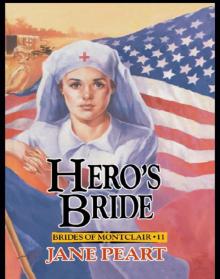 Hero's Bride
Hero's Bride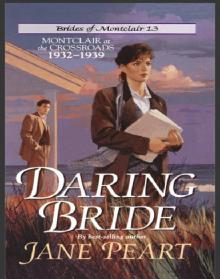 Daring Bride
Daring Bride Runaway Heart
Runaway Heart Promise of the Valley
Promise of the Valley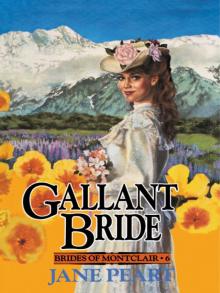 Gallant Bride
Gallant Bride The Pledge, Value
The Pledge, Value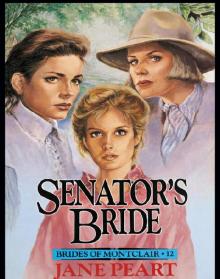 Senator's Bride
Senator's Bride Valiant Bride
Valiant Bride Shadow Bride
Shadow Bride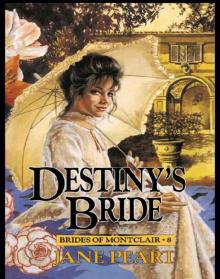 Destiny's Bride
Destiny's Bride A Tangled Web
A Tangled Web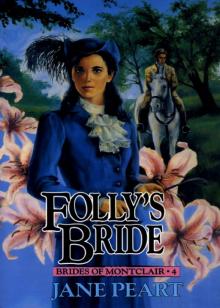 Folly's Bride
Folly's Bride The Promise
The Promise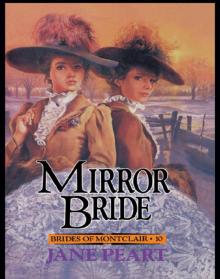 Mirror Bride
Mirror Bride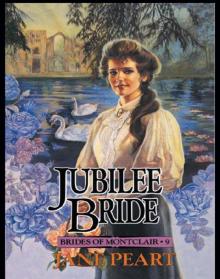 Jubilee Bride
Jubilee Bride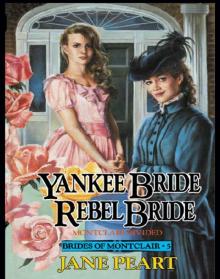 Yankee Bride / Rebel Bride
Yankee Bride / Rebel Bride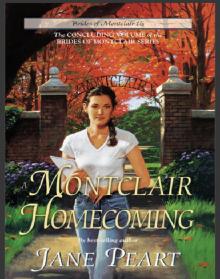 A Montclair Homecoming
A Montclair Homecoming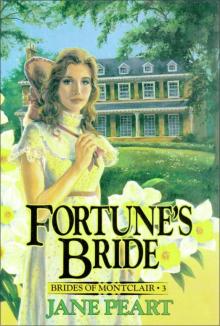 Fortune's Bride
Fortune's Bride Undaunted Spirit
Undaunted Spirit Love Takes Flight
Love Takes Flight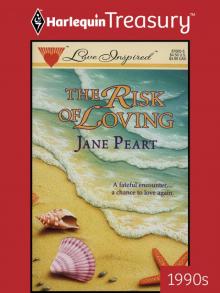 The Risk of Loving
The Risk of Loving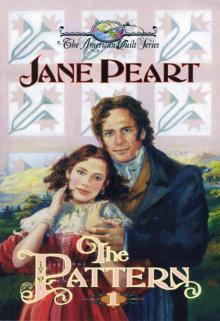 The Pattern
The Pattern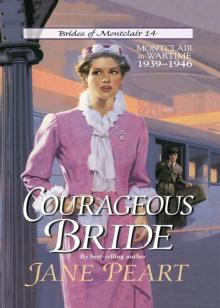 Courageous Bride
Courageous Bride